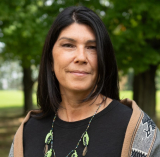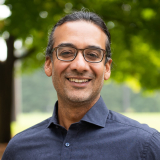CINE Faculty and Staff offer expertise in food, nutrition, ecology, toxicology, and community-based research approaches.
| CINE FACULTY | |
|---|---|
 |
treena.delormier [at] mcgill.ca (Treena Wasonti:io Delormier), Ph.D, P.Dt Professor Delormier's research focuses on food, nutrition and health of Indigenous Peoples. She is involved in health promotion interventions that address the social determinants underlying health inequities that Indigenous Populations experience, particularly in a historical context of colonialism. |
 |
murray.humphries [at] mcgill.ca (Murray M. Humphries) , Ph.D. Professor Murray M. Humphries' work examines how climate change, and other forms of environmental change, affect the food systems and |
|
|
niladri.basu [at] mcgill.ca (Niladri Basu), Ph.D. Professor Niladri Basu's work researches on, develops and applies ecosystem-based approaches to address key problems in the environmental health sciences, applying ecotoxicology and environmental epidemiology to increase understanding of risks associated with contaminants arising from the extraction of natural resources. |
|
|
hugo.melgar-quinonez [at] mcgill.ca (Hugo Melgar-Quiñonez), M.D., Sc.D. Professor Hugo Melgar-Quiñonez's research focuses on the validation and applicability of easy to apply instruments to assess food insecurity and hunger in the developing world and in vulnerable populations in industrialized countries |
 |
brittany.jock [at] mcgill.ca (Brittany Wenniserí:iostha Jock), PhD. Assistant Professor, Department of Family Medicine. Professor Brittany Jock, is Bear Clan from the Akwesasne Kanien’kehá:ka (Mohawk) Territory. She obtained her bachelor’s degree from Syracuse University in chemistry. She holds a master’s degree in epidemiology and a doctorate in social and behavioral interventions from the Johns Hopkins School of Public Health. Her public health training centers on the design and application of mixed methods research and the development, implementation, and evaluation of health programs |
 |
grace.marquis [at] mcgill.ca (Grace Marquis), Ph.D. Professor Grace Marquis' work includes community-based program to examine how social, cultural, institutional, biological, and environmental factors interact to influence a household’s ability to provide optimal feeding and caregiving for mothers, infants, and young children. |
|
|
harriet.kuhnlein [at] mcgill.ca (Harriet V. Kuhnlein), Ph.D., F.A.S.N., F.I.U.N.S., LL.D. (hon.) Professor Harriet V. Kuhnlein’s work brings recognition to the excellent nutritional qualities of unique traditional foods experienced by Indigenous Peoples. |



